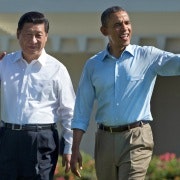The China-US 'war' is now on thaw
In Beijing analysts still struggle to define the precise state of the China-US relationship. As one said to me recently: “Bu shi rezhan, bu shi lengzhan; er shi liangzhan.” Or, in the Queen’s English: “It’s not a hot war, it’s not a cold war; it’s more like a chilly war.”
The problem for leaders, diplomats and analysts is that the relationship defies simple definition. Variants range from “strategic engagement”, “strategic co-operation” and “strategic competition” to “China as a responsible global stakeholder”.
The problem with these ideas is that they mean very little to the Chinese. The phrase that hits home in both capitals these days is “strategic trust deficit” – a gap between China and the US which, if left unchecked, could destabilise the entire Asia-Pacific region.
Such a deficit is potentially disastrous for both parties. We see it in the world of cyber espionage and cyber warfare; in escalating tensions in the East and South China Seas, where hundreds of naval and air assets are deployed; in escalating tensions on the Korean peninsula; and in the UN Security Council stalemate over Syria.
That is why the working summit between presidents Barack Obama of the US and Xi Jinping of China at the weekend was so important. There had been no high-level political mechanism for the two sides to manage these and other apparently intractable challenges facing the regional and global order.
With this summit, with more to follow, we at last have the capacity to build such a mechanism. The fact is, unless the Chinese president himself (simultaneously chairman of the Central Military Commission and general secretary of the Communist party) engages personally in negotiations with his US counterpart, China’s political system is geared to the defence of the status quo. In the US, the secretaries both of state and defence are able to make some strategic calls in negotiations. But their Chinese counterparts are not even among the 250 most senior officials in the party hierarchy. Only the president, in consultation with the other six members of the Politburo Standing Committee, can make the genuinely big calls.
Despite opposition in both capitals, both presidents decided to depart from the diplomatic conventions that have governed relations for the past 40 years and convened a working summit, free of the pomp normally associated with state visits. This is a success in its own right. More importantly, both camps are privately delighted by the tone, depth and content of this first engagement, with neither expecting a laundry list of deliverables. Nobody present saw this as the “cyber summit” described in the US media.
So, what are the outcomes? First, the agreement to establish a regular military-to-military dialogue is critical. It could contribute to rules of the road on cyber security; crisis management for the Korean peninsula; the management of incidents at sea and in the air as well as creating a mechanism to develop basic confidence and security-building measures for the region.
Second, the summit represented the first systematic engagement and calibration between the two nations on the future of North Korea, including their reported public commitment to prevent Pyongyang acquiring nuclear weapons. Third, there was agreement on climate change, perhaps reflecting the start of a commitment to make the global rules-based order more effective.
No one should expect Chinese policy to change quickly. Much could go wrong. But, without a program of working bilateral summitry, there is little prospect of getting much of strategic importance right. After 20 years of drift in the relationship – following the elimination of the Soviet threat, which for the previous 20 years provided the underlying rationale for co-operation – this meeting could mark the start of a new period of detente. We were headed towards strategic competition – or worse. We may now have the capacity to build sufficient trust in the relationship, creating a framework to manage the growing complexity of bilateral, regional and global challenges the nations face.
It could even lead to what Mr Xi himself described as “a new model of great power relations” for the future, one that does not mindlessly replicate the bloody history of the rise and fall of great powers in centuries past.
Kevin Rudd is a former prime minister and foreign minister of Australia
Copyright the Financial Times 2013.
















